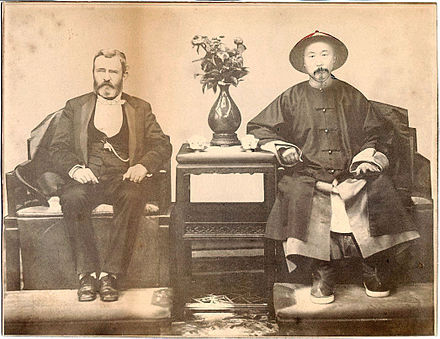Ongoing drama between China and America – A LITTLE BACKSTORY: TWO PREVIOUS SCENES
IN THE ONGOING DRAMA BETWEEN CHINA AND AMERICA
Two episodes can remind us that the complex, through-a-glass-darkly relationship between China and America. It didn’t begin with the tariff standoff.
Some time ago, prominent American Presidents visited China – Tientsin and Peking to be exact. When asked to settle a thorny issue between China and its Asian rival, Japan. In 1877, Ulysses S. Grant had just left the White House when he embarked on a two-year trip around the world. In March of 1878, they arrived in Peking, where General Grant met the Chinese Viceroy and politician Li Hung Zhang. Here is how J.F. Packard describes their first meeting in his epic account, Grant’s Tour Around the World:
The Prince saluted General Grant in Tartar fashion, looking at him
for a moment with an earnest, curious gaze, like one who had formed an ideal
of some kind and was anxious to see how far his ideal had been realized.
As noted the two got along well. Li Hung Zhang was one of the first Chinese leaders to welcome Western influences. He was able to think of China’s common good in the face of both the modernity and foreign influence. Which in turn assaulted what was in many ways still a medieval culture. The Viceroy was “not afraid of railways and telegraphs, and anxious to strengthen and develop China by all the agencies of outside civilization,” according to Packard. He sought Grant’s advice in many matters (civil war among them). Zhang asked Grant to serve as arbiter over a dispute between China and Japan as to the conservatorship of the Ryukyu (“Loochoo”) Island Kingdom.
What was Grant’s advice? According to John Russell Young, another biographer of the world tour, General Grant argued “that China and Japan should make such sacrifices as would settle all questions between them and become friends and allies, without consultation with foreign powers.” Do not borrow from European nations either, he added. General Grant said that incurring debt was to be avoided at all costs. “Loans from foreign powers were always attended with danger and humiliation.” Interesting advice, in light of the billions of dollars in American debt which China currently holds.
In his excellent book A Partnership for Disorder: China and America in World War II, Scholar Xiaoyuan Liu reminds us of a second episode in our mutual history. One lesson we can draw from it is just how much disastrous misunderstanding over vital global issues can take place in a very short time.
He spotlights a moment in recent history when America and China were very much partners.
Professor Liu details how the two victorious allies made grand plans to take over Japan’s Pacific empire at the end of the World War II, and how those mutual plans fell apart. Certainly one of the partnership’s false assumptions, according to the author, was the idea that a government can speak for an entire nation. China’s representatives did not speak for a unified China; civil war was threatening. Soon China would fall into a four-year abyss of hellish change. Asia would not be the same. America was left with an inflated plan for the Pacific region that bore little relevance to political realities.
Chiang Kai Shek comes off as particularly hapless regarding his assessment of other cultures. Furthermore, we have nothing to learn from the Japanese, he said, for “their goods are too cheaply made. The Americans are too fancy, the British too slow. Germany is the only country from which we can learn something.” Too ‘fancy’? I can see FDR being thought of as fancy, but what about TR? Woodrow Wilson? Abraham Lincoln?
America equally bewildered by China, and somewhat clueless as to the Middle Kingdom’s internal realities. Here is FDR’s grasp of internal affairs within China: “I think we are going through a transition period, especially the part relating to North China.” This “transition period” would, of course, turn out to be the rise of Mao Zedong and the Chinese Communist Party that still rules China today. Professor Liu praises FDR’s acumen but criticizes him for being cautious in acting “ahead of events.”
If all this sounds familiar, it should.
Even more, America is today deeply involved in the exact same kind of bewilderment at internal affairs of other nations. It seems to be part of global life. Americans may need to remind themselves that China’s history is nothing like American history. Similarly, It is easy to see today’s industrialized China and forget how very different our 20th centuries were. Certainly recalling episodes in our mutual past can help remind us of the different paths we have taken to modernity. Most noteworthy how easy it can be to make mistaken assumptions.
read more Historical Fiction and similar stories to Ongoing drama between China and America at https://tomdurwood.com/
Got main Page Here
# # #
